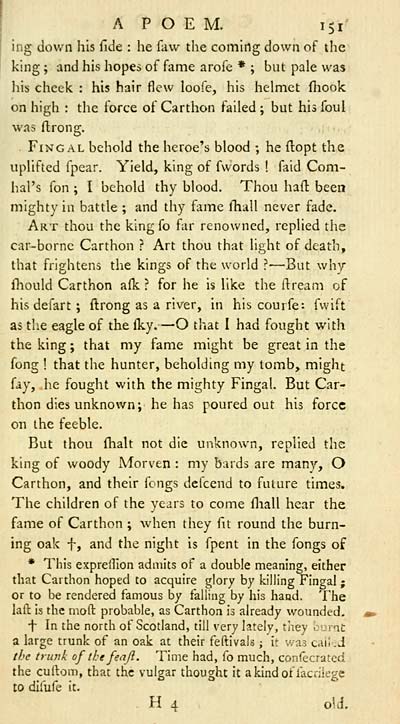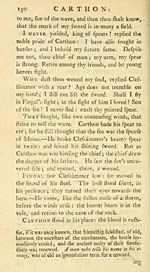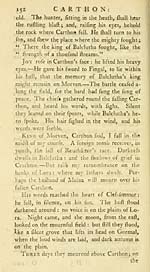Download files
Complete book:
Individual page:
Thumbnail gallery: Grid view | List view

A POEM. 151
ing down his fide : he favv the coming down of the
king ; and his hopes of fame arofc * ; but pale was
liis cheek : his hair flew loofe, his helmet fliook
on high : the force of Carthon failed ; but his foul
was flrong.
FiNGAL behold the heroe's blood ; he flopt the
uplifted fpear. Yield, king of fwords ! faid Com-
hal's fon ; I behold thy blood. Thou haft been
mighty in battle ; and thy fame fhall never fade.
Art thou the king fo far renowned, replied the
car-borne Carthon ? Art thou that light of death,
that frightens the kings of the world ? — But why
fhould Carthon a(k ? for he is like the ftream of
his de fart ; ftrong as a river, in his courfe: fvvift
as the eagle of the Iky. — O that I had fought with
the king ; that my fame might be great in the
fong ! that the hunter, beholding my tomb, might
(jLy, he fought with the mighty Fingal. But Car-
thon dies unknown; he has poured out his force
on the feeble.
But thou fhalt not die unknown, replied the
king of woody Morven : my bards are many, O
Carthon, and their fongs defcend to future times.
The children of the years to come fliall hear the
fame of Carthon ; when they fit round the burn-
ing oak t, and the night is fpent in the fongs of
* This exprellion admits of a double meaning, either
that Carthon hoped to acquire glory by killing Fingal ;
or to be rendered famous by falling by his hand. The
laft is the nioft probable, as Carthon is already wounded.
f In the north of Scotland, till very lately, they .:':rnt
a large trunk of an oak at their feftivals j it v/as caii ;J
//'<? trunk of the fen ft. Time had, fo much, confecrated
the curtom, that the vulgar thought it akindoffaciikge
to dlfufe it.
H 4 old.
ing down his fide : he favv the coming down of the
king ; and his hopes of fame arofc * ; but pale was
liis cheek : his hair flew loofe, his helmet fliook
on high : the force of Carthon failed ; but his foul
was flrong.
FiNGAL behold the heroe's blood ; he flopt the
uplifted fpear. Yield, king of fwords ! faid Com-
hal's fon ; I behold thy blood. Thou haft been
mighty in battle ; and thy fame fhall never fade.
Art thou the king fo far renowned, replied the
car-borne Carthon ? Art thou that light of death,
that frightens the kings of the world ? — But why
fhould Carthon a(k ? for he is like the ftream of
his de fart ; ftrong as a river, in his courfe: fvvift
as the eagle of the Iky. — O that I had fought with
the king ; that my fame might be great in the
fong ! that the hunter, beholding my tomb, might
(jLy, he fought with the mighty Fingal. But Car-
thon dies unknown; he has poured out his force
on the feeble.
But thou fhalt not die unknown, replied the
king of woody Morven : my bards are many, O
Carthon, and their fongs defcend to future times.
The children of the years to come fliall hear the
fame of Carthon ; when they fit round the burn-
ing oak t, and the night is fpent in the fongs of
* This exprellion admits of a double meaning, either
that Carthon hoped to acquire glory by killing Fingal ;
or to be rendered famous by falling by his hand. The
laft is the nioft probable, as Carthon is already wounded.
f In the north of Scotland, till very lately, they .:':rnt
a large trunk of an oak at their feftivals j it v/as caii ;J
//'<? trunk of the fen ft. Time had, fo much, confecrated
the curtom, that the vulgar thought it akindoffaciikge
to dlfufe it.
H 4 old.
Set display mode to: Large image | Transcription
Images and transcriptions on this page, including medium image downloads, may be used under the Creative Commons Attribution 4.0 International Licence unless otherwise stated. ![]()
| Early Gaelic Book Collections > Ossian Collection > Fingal, an ancient epic poem > (189) |
|---|
| Permanent URL | https://digital.nls.uk/77449344 |
|---|
| Description | Selected books from the Ossian Collection of 327 volumes, originally assembled by J. Norman Methven of Perth. Different editions and translations of James MacPherson's epic poem 'Ossian', some with a map of the 'Kingdom of Connor'. Also secondary material relating to Ossianic poetry and the Ossian controversy. |
|---|
| Description | Selected items from five 'Special and Named Printed Collections'. Includes books in Gaelic and other Celtic languages, works about the Gaels, their languages, literature, culture and history. |
|---|

